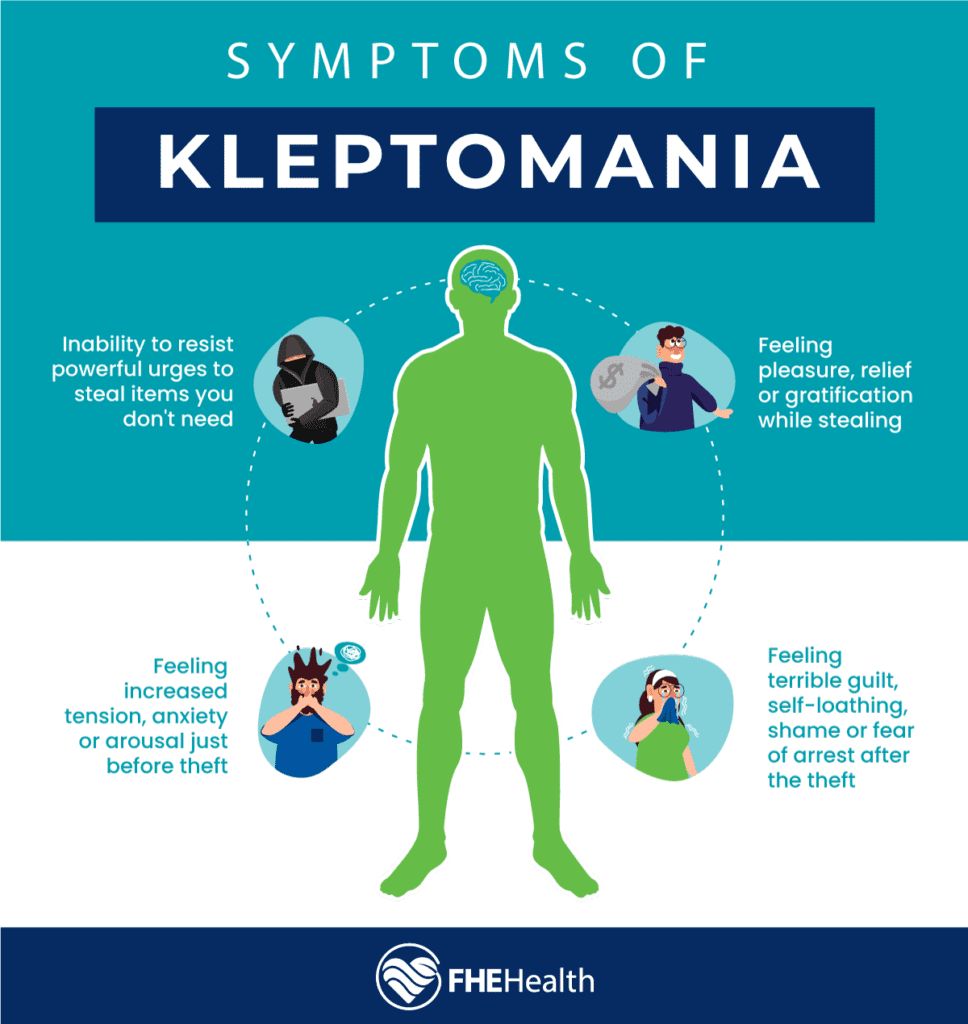
Roughly 0.6% of the population in the United States, or 1.4 million people, suffer from kleptomania. Despite this, many are unaware of what this affliction entails and how to manage and treat the symptoms.
Having an understanding of the condition and how it alters decision-making is vital to seek help for yourself or someone you know suffering from kleptomania. Classified in the Diagnostic and Statistical Manual of Mental Disorders, or DSM, kleptomania is a real disorder, and one that’s complex to control.
Read on to learn more about this challenging condition, with kleptomania facts, symptoms and treatment options to handle this challenging disorder.
Understanding Kleptomania: A Closer Look at the Disorder
Is kleptomania a mental disorder? According to the DSM, kleptomania is an impulse control disorder that causes an uncontrollable urge to steal. In other words, people with kleptomania understand that stealing is wrong, but the impulse is too powerful for them to control.
The stealing doesn’t occur due to a lack of willpower or character. Many people with kleptomania feel intense feelings of guilt and shame for their actions and attempt to compensate by donating items or paying for stolen goods after the fact.
Though there are always undiagnosed cases to take into account, most people diagnosed with kleptomania are assigned female at birth. These individuals are three times more likely to have kleptomania compared to individuals assigned male at birth.
Prevalence and Common Characteristics of Kleptomania
The human brain is a complex organ, and different sections of the brain regulate different kinds of thoughts and actions. Because our “wiring” is so intricate, it varies intensely from person to person.
Research conducted on a group of 204 people found that patients with kleptomania had significantly higher levels of impulsivity compared to others in the group. This data contributes to the idea that individuals with kleptomania can’t help themselves when faced with an opportunity for theft. Not even consequences like significant fines and jail time can deter someone with kleptomania — the impulse they feel is too strong.
It’s critical to keep in mind that kleptomania is a mental disorder. Stealing may alleviate feelings of anxiety or distraction with a sense of pleasure, satisfaction or relief. Financial gain tends not to be a motivation; someone with kleptomania may be compelled to steal seemingly useless things, like cigarette lighters or gum. They also tend to steal from public spaces like stores rather than from friends and family members.
Impulse control can go hand in hand with an addictive personality, and individuals diagnosed with kleptomania are also more likely to suffer from substance abuse disorders.
Factors Contributing to Kleptomania and Its Diagnosis
The exact causes of this condition remain unknown. More research is necessary to determine the root cause and establish solid kleptomania statistics. Here’s a closer look at the contributing factors:
- Problems with serotonin. The neurotransmitter serotonin is a chemical in the brain critical to regulating moods and emotions. Low serotonin levels are connected to individuals who make impulsive decisions.
- Addictive disorders. Stealing can cause a release of dopamine in the brain, a sensation associated with pleasurable activities as well as drug and alcohol use. This rapid release can become addicting and inspire the individual to seek it out again and again.
- Learned habit. Combating impulsive behavior is difficult, and stealing provides quick relief for someone with kleptomania. When the urge becomes overwhelming, the only way to find peace again is by stealing. As a result, stealing becomes habitual, imprinted on the brain as the fastest way to eliminate stress.
- The opioid system. The human brain has an opioid system used to control the urges we all feel on a daily basis. An unbalanced system could make it extremely difficult to resist an impulse like stealing.
The most common way to diagnose kleptomania in someone is when they present symptoms. If you or someone you love is seeking treatment for impulses that feel impossible to ignore, a physical and psychological exam is standard protocol.
During this exam, a mental health provider will talk with you or your loved one about these impulses and how they feel. It’s also standard to present hypothetical situations and discuss any reactions. The provider will then check the results against the DSM guidelines for kleptomania to make a diagnosis.
Treatment Approaches and Coping Strategies for Kleptomania
There isn’t a standard protocol for treating patients with kleptomania, though research is underway to determine the most effective treatment methods. The condition remains difficult to address because most people opt not to seek treatment. Still, there are a few methods with recorded success:
- Medication. This is the most common treatment method recommended by health professionals. Opioid antagonists are the most popular medication to treat and manage symptoms. The medication works by blocking the feelings of pleasure and relief produced by the brain when stealing, discouraging the impulse and putting a stop to the addiction.
- Psychotherapy. The other treatment method recommended by health care experts is psychotherapy. In these sessions, a mental health provider works with the individual to help them understand why they steal things. From there, they work together to develop methods to avoid or change the behavior that leads to stealing.
Everyone is different, and treatment will depend on an individual’s physical health, their medications and their own personal comfort levels. Make sure to speak with a health care provider to understand the potential side effects of treatment for kleptomania.
A Better Life Is Possible
Life is stressful when you or a loved one is trying to overcome a mental disorder like kleptomania, but you don’t need to go it alone. A better, happier path is just around the corner.
At FHE Health, we understand how challenging it can be to seek help. If you’re concerned for your own mental health and well-being or that of a loved one, contact us to learn more about our mental health programs. Our mental health experts are on call 24-7 and ready to work with you to take your first step on the road to recovery.







